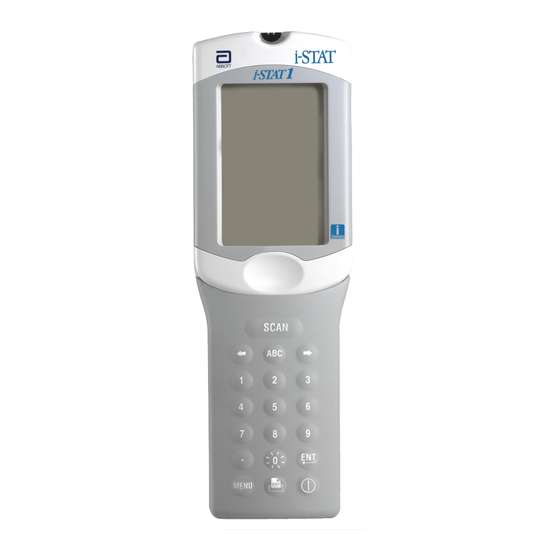- ページ 3
計測機器 Abbott i-STAT 1のPDF ユーザーマニュアルをオンラインで閲覧またはダウンロードできます。Abbott i-STAT 1 9 ページ。 For use with a clia certificate of waiver
Abbott i-STAT 1 にも: クイック・リファレンス・マニュアル (7 ページ)

Replacing Paper in the i-STAT Printer
1.
Open the paper compartment lid by pulling up on the release lever and remove
any remaining paper.
2.
Reel off a few centimeters of paper from the new paper roll, with the leading
edge of the paper feeding forward from the bottom of the roll.
3.
Sit the new paper roll in the compartment such that the leading edge is resting
outside the compartment on the printer casing.
4.
Close the lid until it snaps into place.
Troubleshooting
Unexpected Results
When results do not reflect the patient's condition, repeat the test using a fresh cartridge
and sample. If results are still suspect, test the lot of cartridges in use with i-STAT control
solutions. If the controls are in range, there may be an interfering substance in the
sample. Check the Cartridge and Test Information sheets for the test in question. Test
by another method to verify the result. If the controls are out of range there may be a
problem with the cartridge lot number. Use another lot number or repeat the test using
another method, and refer to Support Services Information in the Technical Bulletin
section of the i-STAT 1 System Manual.
Startup Messages
The handheld performs self-checks when it is turned on. If a condition that should be
corrected in the near future, but that will not affect results, is detected, a warning is
displayed. The operator presses the 1 key to access the Test Menu. The handheld can
be customized to lock out the operator until the corrective action is taken.
Message
Electronic Simulator Test Required
Stored Memory Low
Stored Memory Full
Upload Required
Battery Low
CLEW Expiring, Update Required
14
Action
Insert Electronic Simulator.
Place handheld in Downloader.
Place handheld in Downloader.
Place handheld in Downloader.
Replace batteries or recharge battery.
Update software.
Blood Collection
Acceptable Samples for Cartridges
n
Arterial: Plain syringe, heparinized syringe labeled for analytes to be tested and filled to
capacity, or syringe with minimum volume of heparin to prevent clotting (10 U/mL of
blood). For ionized calcium, use balanced heparin syringes. Mix heparinized syringes by
rolling between palms for at least 5 seconds in 2 directions, then invert the syringe
repeatedly for at least 5 seconds. Test for lactate immediately. Samples for pH, PCO
PO
TCO
and ionized calcium should be tested within 10 minutes. Test for other analytes
2 ,
2
within 30 minutes.
•
Avoid drawing air into syringes for blood gas and ionized calcium tests.
•
If not tested immediately, remix and discard 2 drops of blood before filling
cartridge.
•
Do not use iced samples.
n
Venous: Collection tube with lithium heparin filled to capacity and mixed by gentle
inversion at least 10 times. Test within 10 minutes.
•
Do not leave tourniquet on for more than 2 minutes.
•
Do not draw above an I.V.
n
Skin puncture: Lithium heparin capillary tubes for testing all analytes but ionized
calcium. For all analytes including ionized calcium, use plain or balanced heparin
capillary tubes. Test immediately.
•
Allow alcohol to dry over puncture site before collecting sample.
•
Do not "milk" finger or heel while collecting sample.
n
Coagulation Tests:
•
The ACT test can be performed using venous or arterial samples, while the
PT/INR test can be performed using capillary or venous samples.
•
Use plain plastic syringes or plastic evacuated tubes with no anticoagulant,
activators, or serum separators.
•
Test sample immediately upon draw.
•
For venipuncture, some experts recommend drawing and discarding a sample of
at least 1 mL prior to drawing samples for coagulation testing.
•
If a second measurement is needed, draw a fresh sample.
•
For Indwelling line testing for ACT:
a.
Fluid drip through the line must be discontinued.
b.
If blood must be drawn from an indwelling line, possible heparin contamination
and specimen dilution should be considered. The line should be flushed
with 5 mL of saline and the first 5 mL of blood or six dead space volumes
should be discarded.
c.
Withdraw the sample into a fresh plastic syringe with no anticoagulant, and
test immediately.
•
For extracorporeal line testing for ACT:
a.
Flush the extracorporeal blood access line by withdrawing 5 mL of blood
into a syringe and discard the syringe.
b.
Withdraw the sample into a fresh plastic syringe with no anticoagulant, and
test immediately.
,
2
3
